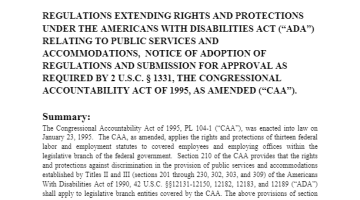Summary:
The Congressional Accountability Act of 1995, PL 104-1 (“CAA”), was enacted into law on January 23, 1995. The CAA, as amended, applies the rights and protections of thirteen federal labor and employment statutes to covered employees and employing offices within the legislative branch of the federal government. Section 210 of the CAA provides that the rights and protections against discrimination in the provision of public services and accommodations established by Titles II and III (sections 201 through 230, 302, 303, and 309) of the Americans With Disabilities Act of 1990, 42 U.S.C. §§12131-12150, 12182, 12183, and 12189 (“ADA”) shall apply to legislative branch entities covered by the CAA. The above provisions of section 210 became effective on January 1, 1997. 2 U.S.C. §1331(h).
The Board of Directors, Office of Compliance, after considering comments to its Notice of Proposed Rulemaking (“NPRM”) published on September 9, 2014 in the Congressional Record, has adopted, and is submitting for approval by the Congress, final regulations implementing section 210 of the CAA.
For further information contact: Executive Director, Office of Compliance, Room LA 200, John Page | 2 Adams Building, 110 Second Street SE, Washington, D.C. 20540-1999. Telephone: (202) 724- 9250.
Supplementary Information:
Background and Summary
Section 210(b) of the CAA provides that the rights and protections against discrimination in the provision of public services and accommodations established by the provisions of Titles II and III (sections 201 through 230, 302, 303, and 309) of the Americans With Disabilities Act of 1990, 42 U.S.C. §§12131-12150, 12182, 12183, and 12189 (”ADA”) shall apply to specified legislative branch offices. 2 U.S.C. §1331(b). Title II of the ADA prohibits discrimination on the basis of disability in the provision of services, programs, or activities by any “public entity.” Section 210(b)(2) of the CAA defines the term “public entity” for Title II purposes as any of the listed legislative branch offices that provide public services, programs, or activities. 2 U.S.C. §1331(b)(2). Title III of the ADA prohibits discrimination on the basis of disability by public accommodations and requires places of public accommodation and commercial facilities to be designed, constructed, and altered in compliance with the accessibility standards.
